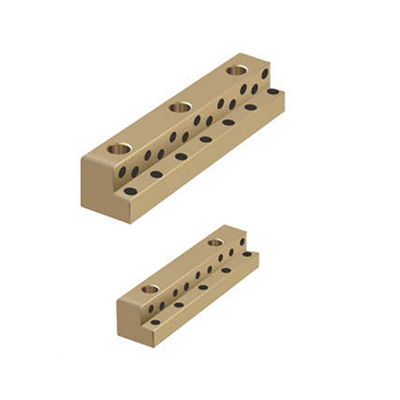As a key mechanical transmission component, bimetal bearings play a vital role in the field of mechanical engineering. It has many unique features and advantages, making it an indispensable key component in many mechanical equipment.
One of the characteristics of bimetal bearings is their double-layer structure. Usually, bimetal bearings are composed of two metal layers with different properties. One layer is a harder metal material, such as copper alloy or aluminum alloy, used to provide the strength and hardness of the bearing; the other layer is a softer metal material, such as lead alloy or tin alloy, used to provide the bearing's lubrication properties . This double-layer structure is closely combined through the action of pressure and heat to form a composite structure, which not only ensures the strength and stability of the bearing, but also improves its lubrication performance.
Bimetal bearings have several significant advantages and features. The hard metal layer on the surface of the bimetal bearing can effectively resist friction and wear, extending the service life of the bearing. Even under high load, high speed or harsh working environment, the bearings can maintain good wear resistance.
Bimetal bearings can maintain stable performance under long-term high-speed operation and are not prone to fatigue fracture or deformation, ensuring the stable operation of the equipment. In addition, bimetal bearings also have good lubrication properties. The soft metal layer on its surface can form a lubricating film, which reduces the friction coefficient and improves the working efficiency of the bearing. This lubricating film can effectively reduce friction and wear and extend the service life of the bearing. Finally, bimetal bearings have strong adaptability. It can adapt to various working environments and working conditions. Whether it is under harsh conditions such as high temperature, low temperature, high speed, high pressure, or under interference load or impact load, the bearing can maintain stable performance.
Bimetal bearings are widely used in various mechanical equipment and industrial fields. They are widely used in the automotive industry, aerospace, machinery manufacturing, power industry and other fields. With the continuous development of science and technology and the continuous advancement of technology, the application fields of bimetal bearings will continue to expand and expand. In the future, bimetal bearings will continue to innovate and improve in terms of materials, processes, and lubrication technologies to provide more reliable and efficient support for the development of the industrial field.
By in-depth understanding of the characteristics and advantages of bimetal bearings, we can clearly understand their importance and value in the field of mechanical engineering. As a key mechanical transmission component, bimetal bearings play an irreplaceable role in improving equipment operating efficiency, extending equipment service life, and reducing maintenance costs. Looking forward to the future, bimetal bearings will continue to play an important role and make greater contributions to the development of all walks of life.
fom{x[a62tfho5.png)

 English
English Español
Español



